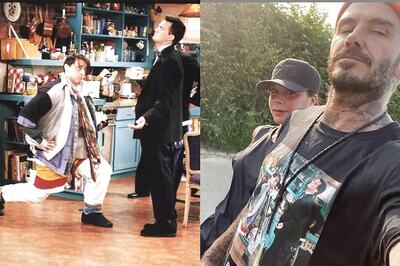
views
While making her stance clear about the growing scrutiny of art for its political correctness, Hollywood actor Scarlett Johansson recently said that “in an ideal world, any actor should be able to play anybody and art, in all forms, should be immune to political correctness”.
Johansson was responding to the backlash she received in the past for accepting a role as a transgender man and starring as a Japanese woman in 2017’s Ghost in the Shell amid cries of whitewashing.
A few years back, Priyanka Chopra’s casting as Mary Kom in the champion boxer’s biopic had sparked off a similar kind of controversy. When Mary Kom was announced in 2013, many celebrated the opportunity to see a mainstream Bollywood film embrace the achievements of a Northeastern sports star for the first time.
Despite the excitement, there was some backlash centered on the film’s lead. Some believed that Chopra was not right for the role, and thought the part should have gone to a Manipuri actor instead.
Chopra had then smartly chosen to give the debate a little coverage by simply saying, “We are making a Hindi film and we wanted the reach of the film to be worldwide. I speak a lot more in Hindi than Mary speaks, and not in Manipuri.”
But today, in the midst of heightened awareness of the importance of inclusion and representation in cinema, we’re having a much different conversation that has ever taken place-- Could actors really afford to escape their ethnic identity box when it comes to appropriation?
Official poster of Mary Kom.
“We can accept Priyanka Chopra as Mary Kom in India because Indian audience is generous enough to accept me as Danny Denzongpa’s brother,” says actor Adil Hussain before erupting in laughter.
Hussain, who is helping Northeast India find its voice in the mainstream cinema, believes it’s more about “respecting” a certain ethnicity than just casting an actor from a particular state.
“Tom Alter played the brother and father of many Indian actors and we accepted him as we are very generous that way. But at the same time, to be more socially, and not politically, correct, it would have been a better choice if we had trained someone from Manipur. And, if we think that it’s hard to find a good actor in Manipur then I don’t want to believe it because they have a strong traditional theatre. Yes, Priyanka played the role credibly but her casting was much more of a commercial choice than anything else,” says Hussain.
On the other hand, Taapsee Pannu says the profession of acting is about being able to convey a character convincingly and hence rejecting an artiste only on the grounds of appropriation is "unfair".
“Why is an actor an actor if he or she is not allowed to get under the skin of some other character? Just because someone’s certain physicality or outlook matches a particular character doesn’t make that person the best actor to perform that role. If that person is not doing justice and not making you actually feel for the character then it’s a different story but without even seeing that person’s performance it’s unfair to write him or her off,” says Pannu.
Defending Chopra’s casting as the six-time world champion from Manipur, Pannu points out, “I think like that we should re-do every film and let’s just be true to the background of each and every character we have ever played in cinema and then I think the entire world cinema will have to change.”
Pannu says the film Mary Kom became what it became and reached each and every household, partly because it was done by Priyanka Chopra.
“Just because Priyanka doesn’t hail from Manipur, it doesn’t make her any less actor to portray the character,” says Pannu.
A still from Super 30.
Most recently, Hrithik Roshan’s physical appearance was brought up as obstacle to him playing mathematician Anand Kumar in Super 30 over the alleged 'brown-facing' of the actor. Super 30 is based on the life of Kumar, a mathematician from a low-income background in the state of Bihar.
Roshan is not the first actor to have darkened his skin for a role though. Hindi cinema has long treated ‘brown-face’ as a relatively benign offence, thereby creating and contributing to stereotypes.
Some recent talked-about performances like Sayani Gupta in Article 15, Ranveer Singh in Gully Boy and Alia Bhatt in Udta Punjab, were also accused of propagating these stereotypes.
In an article, titled The dark reality of Bollywood’s arbitrary portrayal of communities in India, Anoushka Agrawal writes, “Article 15 stars Sayani Gupta, one of the only dark-skinned actresses in Bollywood. Yet her role as a Dalit woman, a member of the lowest caste in India, involved making her skin even darker, to the point that she looked almost grey, capitulating to the mainstream view of what a Dalit should look like.”
It’s not that Bollywood hasn’t traveled considerable distance in representing minorities on screen, and yet, we still find ourselves stuck around the issues related to color.
As casting professional, Nandini Shrikent believes in doing due diligence before finalising an actor for a role.
“I would definitely prefer to cast someone who looks the part and fits into the socio-economic bracket seamlessly, but the economics of film-making often come into play and disrupt this which is a pity,” says Shrikent, who has worked on several critically-acclaimed films like Wake Up Sid, Talaash, Dear Zindagi, Tumhari Sulu and Gully Boy.
Ranveer Singh in a still from Gully Boy.
She, however, refuses to have darkened Ranveer Singh’s "skin tone" for Gully Boy and calls it “a case of continuity.”
Hussain, on the contrary, seems to take a middle stance on the matter.
He says, “It’s an artistic choice of the director or production designer to make him (Roshan) look darker or browner. I don’t think the actor should be blamed for it. Suppose if I play a role of a fair person and I’m made to look fair because of my acting capabilities and my facial structure. Would that argument hold any water as to why couldn’t we find someone from that class? So, I don’t think this argument makes much sense to me.”
But Hussain does believe an actor must take accountability of what he or she is getting into, given the times we’re living in.
“Ideally, I would agree with Scarlett Johansson because that’s why we have become actors as we’re supposed to play anything and everything. But at the same time, we do not live in a vacuum. We live in a society and a particular political context and time and one has to be more aware about why a film is made or who is making it and whether one is agree with the intent of the movie,” he concludes.
(This is the PART I of the series, titled Reel Representation)
Follow @News18Movies for more



















Comments
0 comment